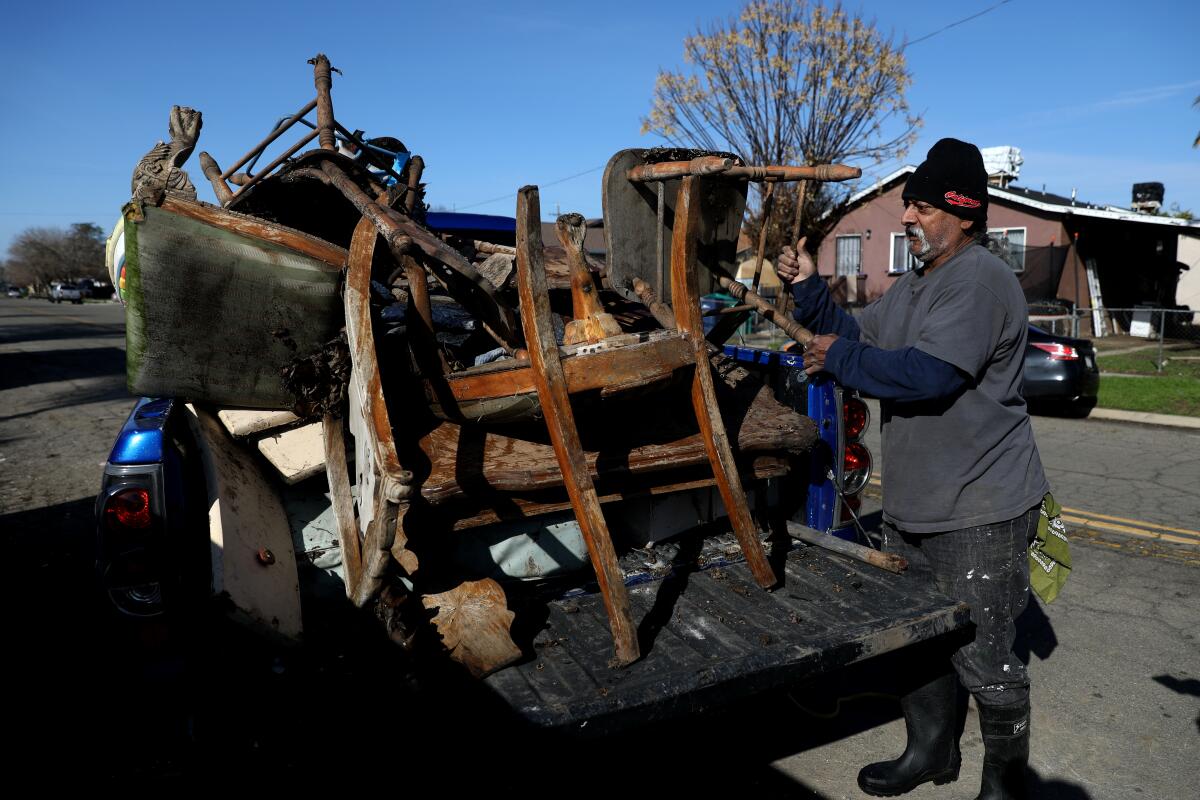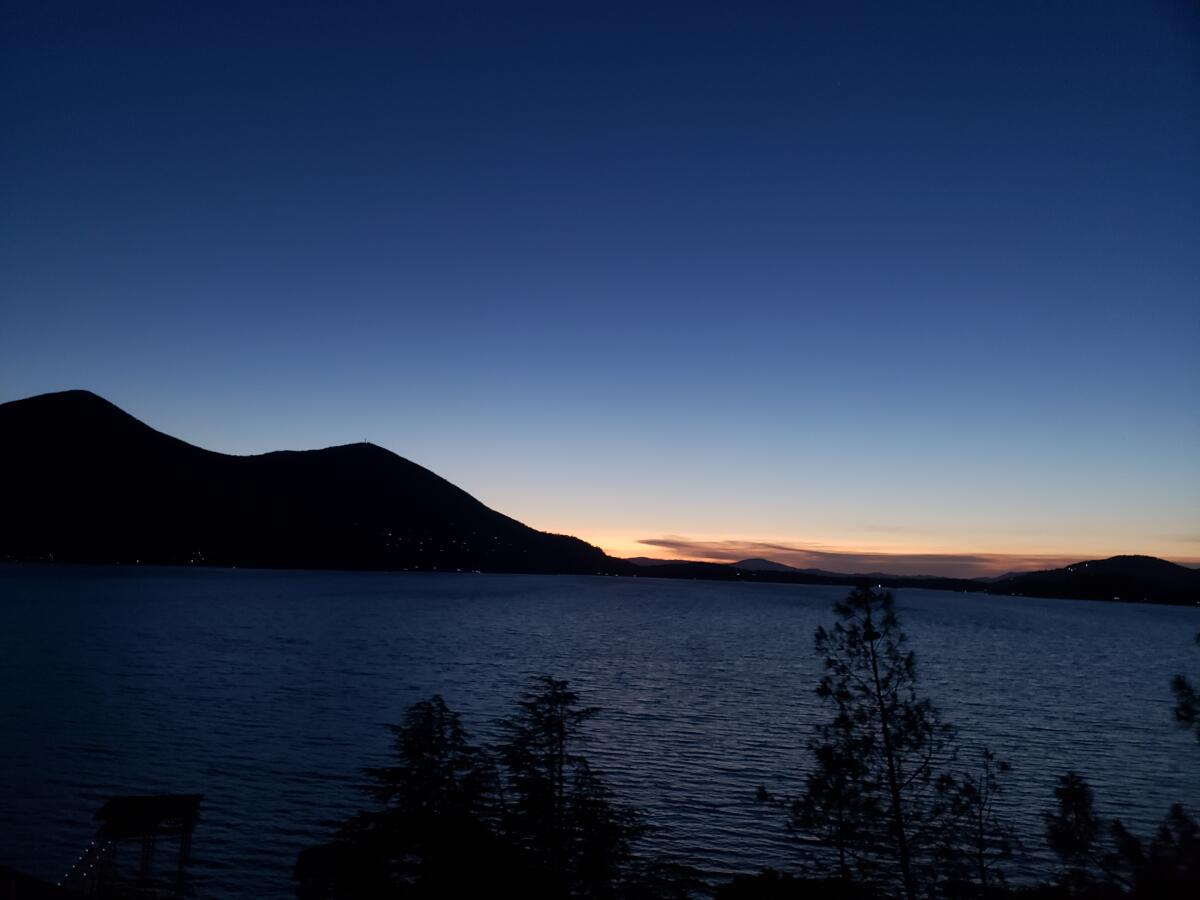A farmworker town destroyed by floods fights to recover

Good morning, and welcome to the Essential California newsletter. It’s Wednesday, Feb. 15, and Cupid is gone for another year. Bring on the leprechauns.
I’m Anita Chabria, a columnist with the Los Angeles Times, and your guide for the day to what’s interesting, important or at least gossip-worthy.
When torrential rains left parts of California underwater a few weeks ago, the tiny town of Planada was one of the hardest hit. You’d be forgiven if you’ve never heard of it — I hadn’t.
But for the 4,000 or so mostly Hispanic residents (it is 94% Hispanic according to the last census), it’s a special place where generations have raised families and worked in the surrounding agricultural fields just east of Merced.
Then the levee broke. Residents had only minutes to gather their loved ones and rush for safety.
My colleague Jessica Garrison went to Planada days after the tragedy, and has followed the plight of the residents since. You can read her heart-wrenching story, which published this week. But she was also gracious enough to share some of her own experiences with me, and what went into the reporting.
Garrison said that her first impression driving into Planada was how charming it was.
“Planada sits at the base of the foothills that rise up into the Sierra and Yosemite National Park, and it has a lovely plaza and a gorgeous park,” she said. “But then I looked closer, and I saw dumpsters filled with flood detritus.”
From there, the devastation became obvious.
“At house after house, the front doors were thrown open and I could see people engaged in demolition: pulling moldy drywall off the walls, scraping up floor tiles, hauling out ruined furniture,” Garrison said. “The park near the center of town had been transformed into a bustling disaster aid center. Volunteers were serving hot meals to people who had been displaced, and handing out diapers and bottled water. The town’s water system was damaged in the flood and people couldn’t drink the water.
Folks from FEMA had just come into town and were helping people sign up for aid — assuming they qualified, which some folks did not because they were undocumented. Everyone I talked to was so friendly — and many people said the same thing to me: Thank you for being here and bearing witness to what happened to us.”
Five weeks after the floods, Garrison said, the mud has turned back to dirt and the sun is out. Most of us have moved on.
“But in Planada, there are a lot of people still hurting. They are displaced. Their homes are destroyed. And many people have no idea how they will put the money together to rebuild,” Garrison said. “Renters, meanwhile, are sometimes in worse shape, because they are dependent upon landlords who may or may not have the money or the desire to fix their homes up.”
So the need for aid is as great as ever — not just for individuals, but for the town as a whole.
“Many people in Planada have said they hope this disaster will be a catalyst to improve their infrastructure,” Garrison told me. “They want more support from the county, state, and federal government for things like strengthening the levee system, improving flood control, and for things like streetlights and sidewalks.”
And now, here’s what’s happening across California:
L.A. STORIES
Media cuts are coming. Walt Disney Co. Chief Executive Bob Iger said last week that the Burbank company will be slashing 7,000 jobs as the firm’s streaming efforts continue to lose money and the wider economy wallows through a downturn. But the House of Mouse isn’t alone in tightening its belt. Across the media and entertainment industry, companies are nixing staff, winnowing down budgets and looking to shore up cash as they steer out of the pandemic and into an uncertain future. Los Angeles Times
POLITICS AND GOVERNMENT

Sen. Dianne Feinstein, California’s longest-serving senator, will not run for reelection next year, marking the end to one of the state’s most storied political careers. At 89, she’s faced both pressure and speculation, but this announcement officially sets off a race for her seat. Los Angeles Times
For the history buffs among you, this piece brings together coverage of the brutal assassinations that propelled Feinstein to higher political office: On a cool November morning in 1978, Dan White strapped on a gun, slipped into City Hall and assassinated Mayor George Moscone and Supervisor Harvey Milk. It was an act of personal and political vengeance that shocked the nation and plunged San Francisco into a tailspin from which it has taken years to recover. Los Angeles Times
How high can they go? Household budgets in the Golden State, already stretched thin as the price of everything from rent to eggs soars, are being pummeled by monster natural gas bills. Utility giants SoCalGas and PG&E began warning customers in January that they would see higher bills after the wholesale price of natural gas hit record highs. But reality didn’t sink in for many customers until bills started to arrive. Los Angeles Times
Lawmakers push to enshrine right to same-sex marriage in California’s Constitution. Lawmakers in California are launching a new attempt to enshrine marriage equality for same-sex couples in the state Constitution. Desert Sun
CRIME, COURTS AND POLICING
New data on police stops show stark racial disparities in wealthy Bay Area enclaves. Despite large police departments across California ramping up their efforts to stamp out racial profiling, those initiatives have done little — if anything — to close the vast gap between Black and white people who are stopped and searched by officers. San Francisco Chronicle
Support our journalism
HEALTH AND THE ENVIRONMENT
Snowmelt is disappearing too fast. For decades, Californians have depended on the reliable appearance of spring and summer snowmelt to provide nearly a third of the state’s supply of water. But as the state gets drier, and as wildfires climb to ever-higher elevations, that precious snow is melting faster and earlier than in years past — even in the middle of winter. Los Angeles Times
Newsom suspends environmental laws to store more Delta water. Facing an onslaught of criticism that water was “wasted” during January storms, Gov. Gavin Newsom on Monday suspended environmental laws to give the go-ahead to state officials to hold more water in reservoirs. Calmatters
CALIFORNIA CULTURE
California’s new celebrity mountain lions. One week after Los Angeles bid farewell to its resident celebrity mountain lion, P-22, during a three-hour memorial at the Greek Theatre, two cubs at the Oakland Zoo have become the latest darlings of California’s wildlife set. Thomas Curwen introduces us to Hazel and Holly, two orphaned kittens rescued from the Santa Cruz Mountains. Los Angeles Times
Jackpot winner revealed. The man who won the record-breaking $2.04-billion Powerball jackpot after buying the prized ticket at an Altadena gas station in November has come forward to collect his winnings. Edwin Castro opted to take a single payout of about $1 billion. Los Angeles Times
Free online games
Get our free daily crossword puzzle, sudoku, word search and arcade games in our new game center at latimes.com/games.
AND FINALLY
And finally, our essential California landmark is Mt. Konocti, from reader David Eng in Clearlake, Calif.

David writes:
Mt. Konocti is 4,305 feet tall and described as extinct. The volcano last erupted 11,000 years ago. It is classified as having high threat potential. It’s a moderate hike to the top, but beware of your surroundings, the sign says. That’s a euphemism for snakes and mountain lions. But we are Californians, risk takers. An entire community is built at the base. Who wouldn’t want a volcano backing you?
What are California’s essential landmarks? Fill out this form to send us your photos of a special spot in California — natural or human-made. Tell us why it’s interesting and what makes it a symbol of life in the Golden State. Please be sure to include only photos taken directly by you. Your submission could be featured in a future edition of the newsletter.
Please let us know what we can do to make this newsletter more useful to you. Send comments to essentialcalifornia@latimes.com.
Sign up for Essential California
The most important California stories and recommendations in your inbox every morning.
You may occasionally receive promotional content from the Los Angeles Times.




